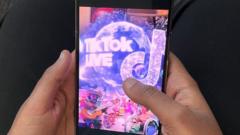Zara, a 20-something American with Somali heritage, recently divulged her overwhelming obsession with TikTok’s live battle feature, which has cost her thousands of dollars meant for university fees. The battles, widely popular among TikTok users globally, take on a unique twist within the Somali community, where influencers represent specific clans and engage in verbal sparring. These contests, dubbed the Big Tribal Game, draw vast audiences as they intertwine music, competition, and a complex digital currency that entices viewers to donate lavishly.
During one recent event viewed by around 50,000 people, two influencers competed to collect more gifts over five-minute rounds. Dominating the crowd's attention, the influencers encourage their followers to support them financially. Strikingly opulent virtual gifts include the "TikTok universe," valued at over $500, and the celebrated "lion," which adds a lively animation to the stream.
Zara, who originally joined the fray out of perseverance for her clan's pride, admitted to spending over $7,000, an addiction that stresses familial relationships and raises questions about her financial choices. This phenomenon, however, bore sinister consequences, as Zara faced harassment and threats from a male influencer, who alleged he could expose private images of her family. Though Zara reported these threats to TikTok, the initial lack of response underscored a disturbing aspect of the platform's community safety protocols.
The allure of the Big Tribal Game lies not just in the potential for entertainment but also in the underlying tensions between Somalia's historical clans, some of which are rife with past violence that still resonates in contemporary society. The influencers often reference historical grievances during these live events, perpetuating a culture of aggression and possibly reigniting old hostilities.
This digital dynamic has led many to express concern that the very culture meant to connect and entertain could instead serve to disrupt and damage communities. Critics highlight the alarming reality that those who fled Somalia in search of safety are now contributing to the amplification of rivalries and tensions from afar. Influencer Bilaal Bulshawi urged a more thoughtful approach to the trend, suggesting that those funds could serve a greater purpose to assist Somalia, which still grapples with severe economic and social issues.
Nonetheless, experts in internet culture caution against oversimplifying the success of these TikTok battles. Crystal Abidin, a researcher in the field, asserts that perceptions of influencers' wealth may be misleading, given that the platform retains a significant cut of the donations while many aspects of the economic framework of these events remain opaque.
As Zara navigates the consequences of her choices, it’s clear the delivery of entertainment on platforms like TikTok includes not only joy and engagement but also potential pitfalls that compel users to reassess their engagement with modern technology, clan pride, and community dynamics. For many involved in the Big Tribal Game, it reveals a longing for connection that may come at a hefty price.




















